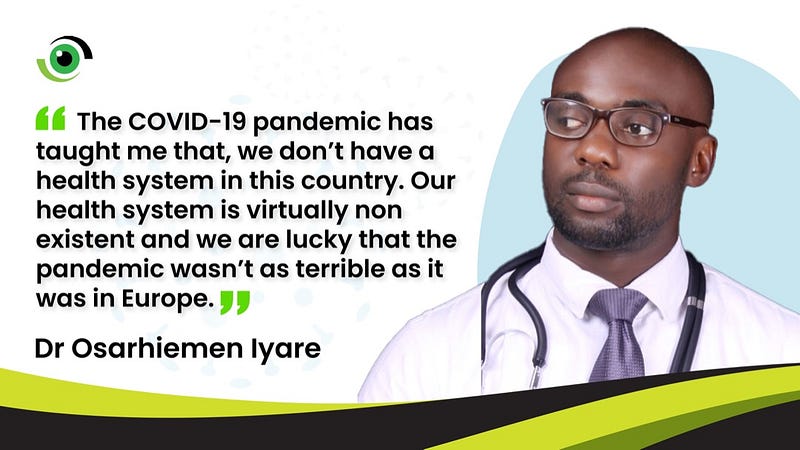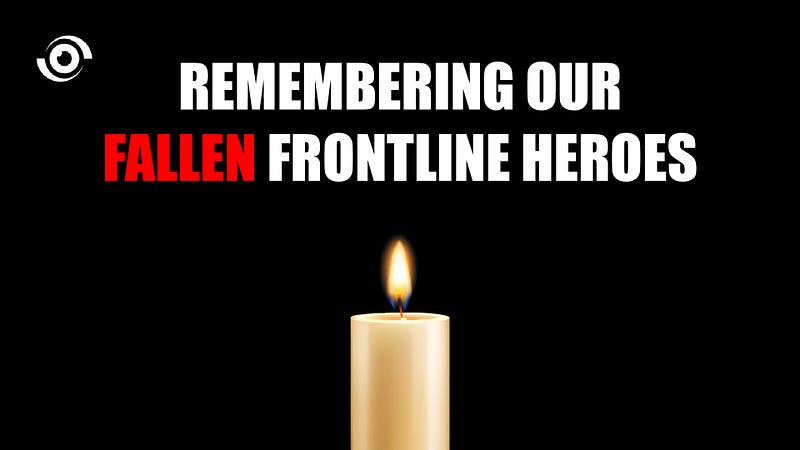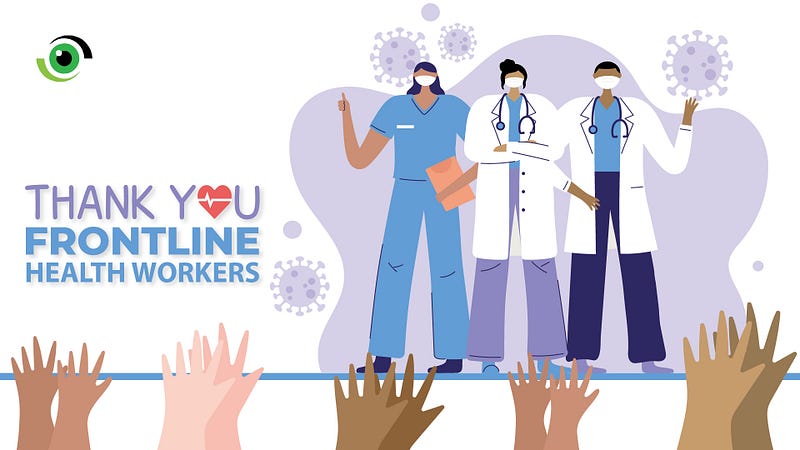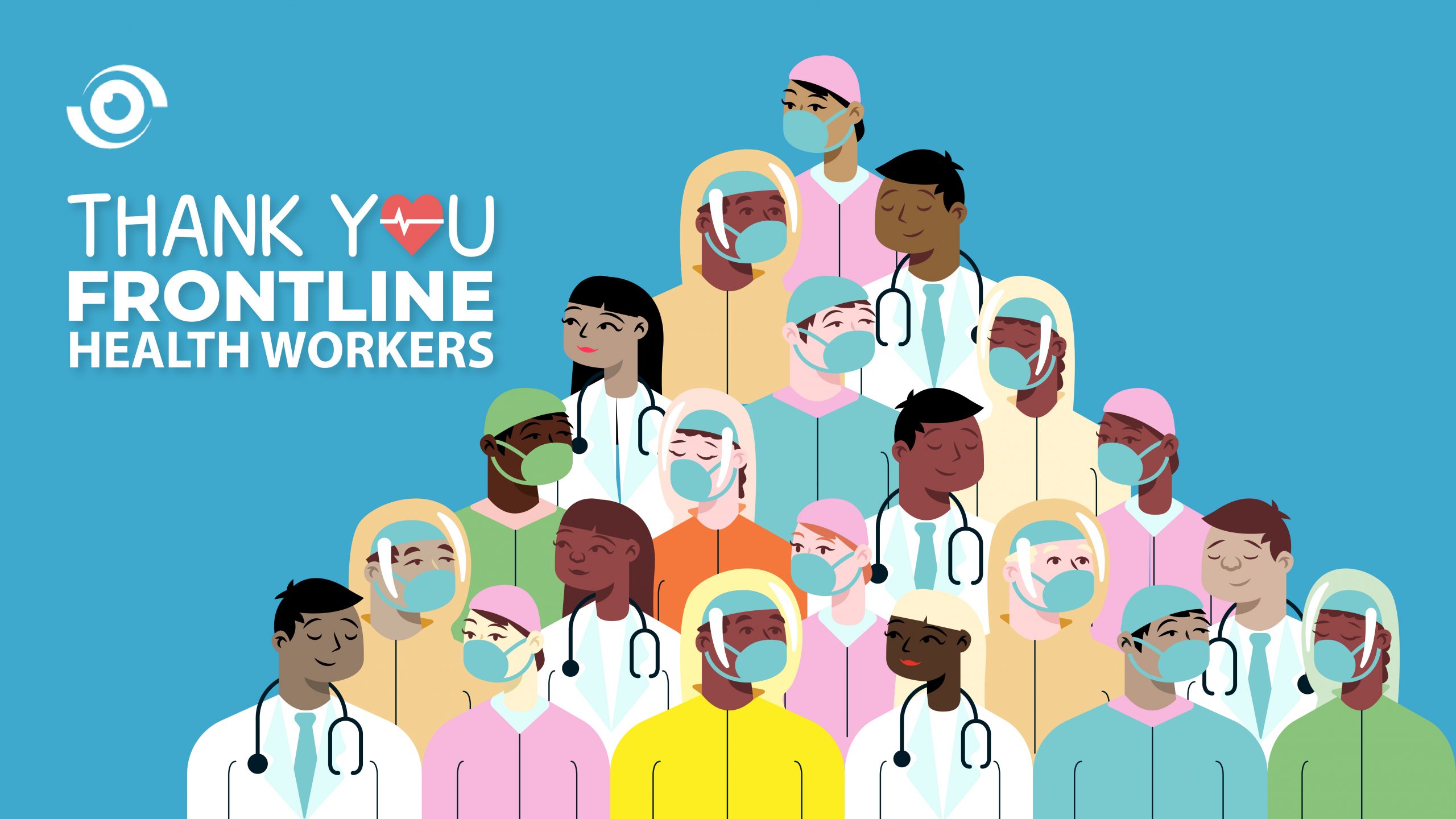By Beti Baiye & Patience Adejo (Lead Writers)
It is not surprising that the fight against COVID-19 has introduced a great deal of military metaphors in the media globally. The world has been at war with a virus and from the outset, healthcare workers of different cadres have been at the frontline of defense between the people and the virus. They are the ones who must report to work in the face of known and unknown threats to their physical health and this has earned them the term — Frontline Workers.
In military terminology, the front line is the position closest to the area of conflict of an armed force’s personnel and equipment, usually referring to land forces. When a front between opposing sides forms, the front line is the area where each side’s forces are engaged in conflict. In pandemic’s context, health workers became the real front liners when, while the rest of the world retreated to their homes to stay safe, they stepped out to contain the spread of the disease, care for affected patients and embark on research to better understand COVID-19.
Many soldiers have seen the horrors of war first-hand. As terrifying as it was, they knew who they were fighting, and could recognise their enemy. But COVID-19 is different. In this battle, we have an invisible enemy who is sometimes deadly, and this makes the battle tougher.
The pandemic has impacted life in more ways than one. Almost every aspect of society is dealing with significant challenges and is being forced to adjust and adapt to a new normal. Around the world, doctors, nurses, lab scientists and technicians, pharmacists, community health workers and others have experienced an extraordinary increase in workload in overstretched and sometimes ill-equipped health facilities. In Nigeria, healthcare workers at the frontline response have had to deal with a frail and overloaded healthcare system. Despite the odds, they continue to work to safeguard our communities from the virus.
Reflections from the COVID-19 frontline
We at Nigeria Health Watch spoke to some frontline workers, asking them to share their experiences and challenges in 2020 in relation to dealing with the pandemic, and their expectations for 2021. We curate a few of their thoughts below.

“The COVID-19 pandemic has taught me that we don’t have a health system in this country. Our health system is virtually non- existent and we are lucky that the pandemic wasn’t as terrible as it was in Europe. It’s been difficult to have to deaden my conscience not to work because I don’t have equipment to do the work. You have a patient that you have to see but you don’t have what to use to see the patient, basic things, basic PPEs, you don’t have it available and you have to make a lot of noise before those things are released.” — Dr Osarhiemen Iyare, Medical Doctor, Abakaliki.
“Dealing with COVID-19 has made me understand that with effective health measures, we can live healthy and normal lives as long as we follow the WHO recommended guidelines for prevention of the novel coronavirus. The most difficult thing about being a frontline responder is the risk of acquiring this disease while trying to save lives. I am most proud that even with rising cases and deaths every day we have been able to show up and do our best to save lives. I hope that this coming year, every individual will understand the implication of this disease to our community and participate in the implementation of all preventive measures to fight this disease.” — Tyfang Myra Wakuna, Medical Doctor, Cameroun
“COVID-19 has taught me that life is too short, and every effort spent helping others counts. The most frustrating thing about being a frontline worker is the flouting of COVID-19 protocols by leaders in the society fueling disbelief amongst the rest of the population and the associated spread, sickness and deaths. I’m grateful for every opportunity I have had to help communities and local hospitals understand and cope with COVID-19, in collaboration with the Disease Surveillance’ Rapid Response Team in Lagos Island Local Government Area of Lagos State, Nigeria. Next year, I hope for quick deployment and use of COVID-19 vaccine to bring about the beginning of the end of this pandemic.” — Dr Oladapo Asiyanbi, Medical Doctor, Lagos State.

“Dealing with COVID-19 has taught me that here in Nigeria, the health sector is ill equipped and not properly organised. The most difficult thing about being a frontline responder is the “myths” surrounding the epidemic. I’m proud of each opportunity I get to educate people about the misconceptions surrounding COVID-19. In the coming year, I hope for honesty in the part of the government than playing politics with the pandemic.” — Christian Nnoli — Physiotherapist, Abuja
“COVID-19 taught me to treat every patient as a potential infected patient. It’s difficult having to take care of yourself when infected from the job, whether you have money or not. Next year, I look forward to seeing a greater level of preparedness.” — Victoria Adepoju, Medical Doctor, Ibadan
“The most difficult thing about being a frontline worker is the anxiety. Is the patient in front of me positive? If I get an infection at work, will I infect my family when I get home? Every little symptom makes one apprehensive. I am proud that on the public health front, medics have been put on the pedestal for offering guidance to society on how we move forward. For once, vast sections of society have also agreed to our directions and guidance, sometimes, even at great personal losses like jobs, income, personal family connections, missed events and gatherings. The cost of testing for and managing the virus has been too high. I’m hopeful that next year, more people in Africa can have access to testing facilities. The vaccine rollout will also allow us a return to normalcy.” — Dr Ometa Edward, Medical Doctor, Kenya.
“The most important thing I have learnt this period is that little things like just listening to patients express their fears and offering psychosocial support really makes a difference in their lives. The most difficult thing about being a frontline responder is having to break the news of a positive result especially to patients dealing with the loss of loved ones from COVID-19 or other psychosocial issues.
I am most proud that I was able to provide mental health care for a significant number of patients and supported them during the illness up until recovery. The joy following a negative result is unexplainable! I hope that in the coming year, more funding will be allocated to healthcare in order to strengthen our health system to allow us keep fighting the virus. I also hope that we can get vaccinated against COVID19.” — Dr Obehioye Aimiosior, Medical Doctor, Lagos State
“As a health worker one of the most significant things that dealing with COVID-19 has taught me is the need to go back to the health practices we had neglected. Practices like frequent washing of hands, the use of sanitisers, and physical distancing. The most difficult thing about being a front-line responder is getting people to understand that COVID-19 is real and practice safety guidelines. It is also working with the fear of being infected by the virus. I’m proud of being able to save lives and contribute positively to providing adequate health care and communicating right information to my clients and patients. Next year, I look forward to tremendous improvement in our Nigerian health sector.” — Mrs Olukoya Faith Ngozi Aleyakpo, Matron, Abuja.
Celebrating courage, grit, and sacrifice
In spite of the many challenges they have experienced, healthcare workers, the true heroes of the fight against COVID-19, have certainly been put to the test time and again as they have remained at the frontlines to help the sick and control the spread of the disease.

Nigeria Health Watch is extremely grateful to all frontline workers who have risked their lives to save ours and we will like to end the year 2020 by celebrating and paying tribute to these heroes for their selfless service and the crucial role they play in fighting the pandemic. Let’s honour their sacrifices by committing to all efforts that will end this pandemic.
What can we do to support them?
- Ensure that all health workers are first in line to receive the COVID-19 vaccine.
- Ensure that all allowances and salaries are paid and that health workers are adequately compensated for their work.
- Provide quality equipment and facilities necessary to effectively carry out their work.
- Ensure sufficient supply of PPEs and other protective equipment needed to stay safe as they do their job.
- Like the Governor of Yobe state did recently, recognise their sacrifices and celebrate them.
- If you know any health workers personally, do something personal for them to show how much you appreciate their sacrifice.
- Stay home as much as you can and if you must go out, follow official guidelines and advisories to protect yourself and your family, community and state.
The sacrifices made by frontline workers who lost their lives to COVID-19 while treating infected patients will never be forgotten. We applaud these heroes of humanity for their courage. May their souls rest in peace.


